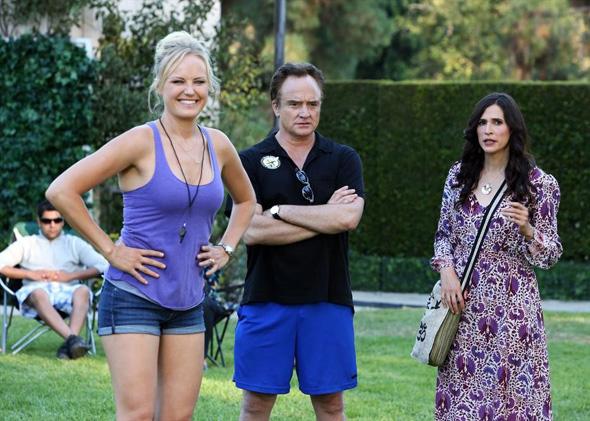There is no such thing as too bland a sitcom title. Friends, Cheers, Seinfeld, Roseanne, The Office all have simple and boring but effective names. These names may paper over the show’s idiosyncrasies and hard edges, but they do what sitcom names need to do: They don’t put anyone off. A few years ago, ABC alienated potential viewers of Cougar Town by burdening it with a tawdry moniker that referenced women who fixate on dating younger men, an association it couldn’t shake even as it became a series about friends who drink too much. Yet apparently even after the Cougar Town debacle, ABC has not internalized that sitcom titles are not the venue for reclaiming derogatory terms, work that is best left to the show itself. ABC’s strongest new sitcom is called Trophy Wife, an insult to its lovely, daffy main character and a title that’s at odds with the show’s focus on female relationships. A rose by any other name would smell as sweet, but that doesn’t mean it would get better ratings if it were called a sex flower.
The wonderfully cast Trophy Wife, which is based on the life of its creator Sarah Haskins and premieres tonight, stars Malin Akerman as Kate, a young, rowdy woman who, one night at karaoke, literally falls into the lap of a charming, funny, grounded older man named Pete (West Wing’s Bradley Whitford). Pete is not, whatever the title suggests, in the midst of a midlife crisis: He’s just a guy with two ex-wives and three children. When Kate marries him, she is wedded not just to Pete, but to a whole new adult lifestyle, complete with a loud, opinionated, demanding family of stepchildren and ex-wives, who talk all over one another almost as well as the cast of Parenthood.
Trophy Wife is a neat amalgam of the biggest trend of this fall season—the family sitcom—with the biggest trend of two fall seasons ago—the female-centric sitcom. In the length of the pilot, Kate goes from living a lifestyle straight from any of the shows with “girl” in the title, to one right out of Modern Family. Unlike the girls of the girls shows, new wife and stepmom Kate can’t meander about maturing. She’s got to do it and fast, and this process, not Kate’s marriage, is the fount of Trophy Wife’s humor: the topsy-turvy way that Kate learns to identify with the grown-ups and not the kids.
Trophy Wife is nominally about a marriage, but if its very polished and sure-handed pilot is any indication, it is just as focused on Kate’s dynamic with Pete’s ex-wives. (If there is not an English term for this relationship, there must be one in Yiddish.) You don’t cast Marcia Gay Harden, playing ex-wife No. 1, and Michaela Watkins, playing ex-wife No. 2, and give them nothing to do. Gay Harden, in imperious, intimidating mode, plays Diane, a doctor and mother of twins, who doesn’t think much of Kate and refers to her as “young lady” at their first meeting. Watkins is Jackie, the mother to an adopted son Bert (the ridiculously cute, outspoken Albert Tsai) and as new-agey, sensitive, and flighty as Diane is stern. Unlike New Girl and The Mindy Project, shows about spazzy single women interacting with a supporting cast that’s almost all male, Trophy Wife is about a spazzy married woman interacting with a supporting cast that’s mostly all female. On Trophy Wife, the ladies get to steal all the scenes, which is why the title is such an egregious mistake: It’s not just dumb marketing, it belies the women-are-not-reducible-to-clichés spirit of the show.
I will confess that when Gay Harden walked onto the screen, commanding and no-nonsense, I immediately thought I had identified Trophy Wife’s fatal flaw: How can I be expected to root for Malin Akerman over Marcia Gay Harden? It’s like preferring Laffy Taffy to a perfectly toothsome slice of chocolate cake. But Akerman is beyond game. Like the late Happy Ending’s Elisha Cuthbert, she seems to delight in going for it in the way that only pretty blond women who have been stuck playing pretty blond love interests in romantic comedies can. Akerman bumps into things with abandon and just the right glimmer of grace. Her knees knock and her limbs fold up like a newborn colt, learning to walk. But her show, anyway, already has legs.
